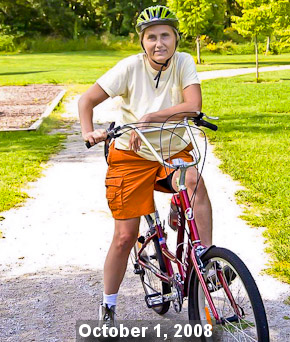Eating cherries can reduce the risk of gout attacks, a study has suggested.
http://www.bbc.co.uk/news/health-19746453
Seach my blog
Monday 22 October 2012
Tuesday 9 October 2012
'Flu' vaccine in pregnancy?
This is a great, well-balanced article, written by a someone who is a US medical doctor, midwife and Medical Herbalist.
http://avivaromm.com/flu-vaccine-in-pregnancy-whats-a-girl-to-do
http://avivaromm.com/flu-vaccine-in-pregnancy-whats-a-girl-to-do
Sunday 7 October 2012
Four Thieves' Vinegar
 |
| Four Thieves' vinegar |
There are many versions, of the recipe and the myth. It is said that four thieves were arrested in France for stealing from the sick during the plague. They handed over their recipe for the medicinal vinegar that kept them healthy, in exchange for their life and freedom.
The essential ingredients are vinegar and crushed garlic, but the other ingredients vary depending on what is to hand.
Place equal amounts of garlic, and 4 or 5 aromatic dried herbs and/or spices in a jar (eg. rosemary, sage, mint, cinnamon) with a smaller quantity of cayenne (chilli) (optional).
Cover with red wine vinegar or cider vinegar. Replace the lid.
Keep somewhere cool and dark. Gently shake every couple of days.
Strain and bottle after 2-3 weeks.
Take 1 tsp regularly throughout the day to fight a cold (can also be used as a salad dressing or topically when you need a skin antiseptic).
Saturday 22 September 2012
The drugs don't work: a modern medical scandal (The Guardian, 2012)
"Drugs are tested by their manufacturers, in poorly designed trials, on hopelessly small numbers of weird, unrepresentative patients, and analysed using techniques that exaggerate the benefits........"
Read more:
http://m.guardian.co.uk/business/2012/sep/21/drugs-industry-scandal-ben-goldacre?cat=business&type=article
Read more:
http://m.guardian.co.uk/business/2012/sep/21/drugs-industry-scandal-ben-goldacre?cat=business&type=article
Tuesday 18 September 2012
Free health chats
For anyone in Wiltshire:
I will be offering free health chats and advice at Swindon Pulse Wholefoods (27 Curtis St) on Thursday 4th October, 2012. No booking required - just drop in between 10am - 12 noon (see also www.lynblythe.com)
I will be offering free health chats and advice at Swindon Pulse Wholefoods (27 Curtis St) on Thursday 4th October, 2012. No booking required - just drop in between 10am - 12 noon (see also www.lynblythe.com)
Herbal remedy for digestive disorder (Daily Telegraph, 2012)
"Nikki Page finds her life is transformed when she discovers a cure for her
chronic digestive disorder".
http://www.telegraph.co.uk/health/wellbeing/7930256/Herbal-remedy-for-digestive-disorder.html
http://www.telegraph.co.uk/health/wellbeing/7930256/Herbal-remedy-for-digestive-disorder.html
Want to read more about Herbal Medicine?
Encyclopaedia of Herbal Medicine (DK Natural Health) by Andrew Chevallier Dec 2000)
Winston & Kuhn's Herbal Therapy and Supplements: A Scientific and Traditional Approach by Merrily A. Kuhn
(28 Mar 2012)

If you ever doubted good food can make a difference.....
Dr. Terry Wahls - Minding Your Mitochondria
This short video clip is a lecture by Dr Terry Wahls, a medical doctor with Multiple Sclerosis, who changed her diet and was subsequently able to get out of her wheelchair. It's well worth watching.
http://www.youtube.com/watch?v=KLjgBLwH3Wc&feature=youtube_gdata_player


A better route to migraine relief (Dr. A. Weil) - The Huffington Post (2010)
An article written by a Harvard educated botanist and medical doctor:
http://www.huffingtonpost.com/andrew-weil-md/a-better-route-to-migrain_b_526945.html
http://www.huffingtonpost.com/andrew-weil-md/a-better-route-to-migrain_b_526945.html
Turmeric (Curcuma longa) and Alzheimer's Disease
Turmeric (Curcuma longa) is familiar as a spice used in cooking, but over the last two decades research has been attempting to uncover turmeric's history of use by herbalists. It is frequently given to people with inflammation and ailments such as arthritis, circulatory disorders and skin conditions (eg. psoriasis), as well as to improve digestion.
Here's one of many such research findings (many other examples can be found in the references at the end of the article):
Here's one of many such research findings (many other examples can be found in the references at the end of the article):
The effect of curcumin (turmeric) on Alzheimer's disease: An overview http://www.ncbi.nlm.nih.gov/pmc/articles/PMC2781139/
 |
| Turmeric (Curcuma longa) |
Capsule making - these contain turmeric, ginger, celery seed, black pepper and frankincense resin:
 |
| Capsule making |
Sunday 16 September 2012
Chaste tree (Vitex agnus-castus) and hormone regulation
 |
| Chaste tree (Vitex agnus-castus) |
Chaste tree (Vitex agnus-castus) has a long history of use by those with menstrual problems and infertility. It is considered to be one of the most important herbs for hormone regulation. It has also been used by those with problems linked to the menstrual cycle, for example, some migraines and acne, as well as menopausal symptoms.
http://www.ncbi.nlm.nih.gov/pubmed/11159568
http://www.ncbi.nlm.nih.gov/pubmed/12809367
Although usually thought of as a herb for women, it can be prescribed for acne in young men.
Herbalists combine several herbs together when making up a prescription.
Thursday 13 September 2012
Cold and 'flu' season approaches
So, as we leave the Summer behind, and head towards the cold and 'flu' season, what can we do to help prevent respiratory infections?
Elderberries (Sambucus nigra)
There is mounting evidence to support herbalists' use of elderberries to fight colds, 'flu' and other respiratory ills.
http://www.ncbi.nlm.nih.gov/pubmed/21352539
The berries are rich in Vitamin C and anthocyanins, reported to be significantly antioxidant and antiviral.
Elderberry syrups are a popular traditional cold remedy:
The syrup can be taken either 1 tsp every couple of hours during a cold, maybe mixed with other tinctures or remedies, or boiled water added to make a drink to help fend off a cold.
Onion syrup
This sounds like an acquired taste, but is surprisingly palatable, made very quickly and uses ingredients found readily to hand.
At the first sign of a cold coming on:
A chopped up garlic clove can be added in with the onion - if you don't mind repelling friends and visitors as well as your cold!
Elderberries (Sambucus nigra)
There is mounting evidence to support herbalists' use of elderberries to fight colds, 'flu' and other respiratory ills.
http://www.ncbi.nlm.nih.gov/pubmed/21352539
The berries are rich in Vitamin C and anthocyanins, reported to be significantly antioxidant and antiviral.
Elderberry syrups are a popular traditional cold remedy:
- Remove elderberries from their stalks by pushing them off with a fork.
- Weigh the ripe berries, then simmer them in half their volume of water for about 20 minutes.
- Strain through muslin or a jelly-bag.
- Cool, then squeeze out the juice.
- Measure the juice and add half the weight of sugar.
- Simmer for another 20 minutes, then pour into warmed sterilized jars or bottles.
The syrup can be taken either 1 tsp every couple of hours during a cold, maybe mixed with other tinctures or remedies, or boiled water added to make a drink to help fend off a cold.
 |
| Elderberry Syrup |
Onion syrup
This sounds like an acquired taste, but is surprisingly palatable, made very quickly and uses ingredients found readily to hand.
 | |
| Onion syrup |
At the first sign of a cold coming on:
- Chop an onion.
- Layer (alternating) the onion pieces with honey (or sugar) in a jar.
- Finish the layering with honey (or sugar) on the top.
- Place the jar in the 'fridge.
- Within hours the honey (or sugar) will have drawn fluid out of the onion.
- Take a teaspoon of the fluid (ie. syrup) every couple of hours.
A chopped up garlic clove can be added in with the onion - if you don't mind repelling friends and visitors as well as your cold!
Arthritis and Boswellia
An extract of Boswellia (Boswellia serrata) has been reported to significantly reduce pain and improve function in patients with osteoarthritis of the knee.
It was concluded that the extract may have achieved this effect by reducing inflammatory modulators or by reducing degradation of cartilage in the joint.
Read more: http://www.ncbi.nlm.nih.gov/pubmed/18667054
Herbalists prescribe Boswellia to people with many other conditions too, such as ulcerative colitis. Generally a prescription will consist of several herbs, tailored to each individual.
It was concluded that the extract may have achieved this effect by reducing inflammatory modulators or by reducing degradation of cartilage in the joint.
Read more: http://www.ncbi.nlm.nih.gov/pubmed/18667054
Herbalists prescribe Boswellia to people with many other conditions too, such as ulcerative colitis. Generally a prescription will consist of several herbs, tailored to each individual.
 |
| Boswellia serrata |
 |
| Boswellia serrata resin |
Sunday 9 September 2012
Why plants are (usually) better than drugs (Dr. A. Weil) - The Huffington Post 2012
An article written by a Harvard educated botanist and medical doctor:
http://www.huffingtonpost.com/andrew-weil-md/why-plants-are-usually-be_b_785139.html
http://www.huffingtonpost.com/andrew-weil-md/why-plants-are-usually-be_b_785139.html
Friday 7 September 2012
Why Visit a Herbalist
Herbal medicine has been used for thousands of years.
Medical Herbalists are trained to combine the benefits of this
traditional use with information emerging from modern scientific
research.
Qualified Medical Herbalists are able to devote time to considering your overall health and root cause of the symptoms you are experiencing.
They are highly trained in selecting a carefully balanced combination of herbs to address an individual’s symptoms, and to tie this in with the whole of your medical history.
The selection of herbs for your prescription will be based on the use of the herbs over many years, along with additional information gained from any more recent research.
This will include the selection of the most appropriate form of the herbs. For example, some effects are better achieved with a tea, others with a medicine.
Medical Herbalists have access to high quality plant medicines and preparations.
The medicines and preparations prescribed by a Medical Herbalist are made using the whole plant rather than isolated and processed constituents. This method of prescribing has been used for many years, as herbalists believe it improves tolerability and safety.
Medical Herbalists are trained to recognize when it is necessary or beneficial to refer a patient to their GP, or another healthcare practitioner.
Thursday 6 September 2012
More About Herbal Medicine
Herbal medicine is made from plants (for
example, Echinacea and St. John’s Wort), and has been used for thousands
of years. Medical Herbalists are trained to combine the benefits of
this traditional use with information emerging from modern scientific
research.
Medical Herbalists see people with most conditions treated by GPs
These conditions range from short-term or mild problems, to more long-term and complex.
Examples include:
• Heart and circulation problems– high blood pressure, high cholesterol, varicose veins, angina, poor memory
• Respiratory problems – asthma, hayfever, sinusitis, ear infections, bronchitis, coughs, colds
• Digestion problems – IBS, colitis, ulcers, constipation, reflux, bloating, food intolerance
• Nervous system problems – poor sleep, headaches, anxiety, depression, stress, multiple sclerosis, Parkinson’s disease
• Women’s health – PMS, period pains, cystitis, infertility, endometriosis, PCOS, menopausal symptoms, fibroids, irregular periods
• Men’s health – prostate problems, infertility
• Musculoskeletal problems – arthritis, gout
• Skin problems – eczema, psoriasis, acne
• Immune system problems –fatigue, allergies
Examples include:
• Heart and circulation problems– high blood pressure, high cholesterol, varicose veins, angina, poor memory
• Respiratory problems – asthma, hayfever, sinusitis, ear infections, bronchitis, coughs, colds
• Digestion problems – IBS, colitis, ulcers, constipation, reflux, bloating, food intolerance
• Nervous system problems – poor sleep, headaches, anxiety, depression, stress, multiple sclerosis, Parkinson’s disease
• Women’s health – PMS, period pains, cystitis, infertility, endometriosis, PCOS, menopausal symptoms, fibroids, irregular periods
• Men’s health – prostate problems, infertility
• Musculoskeletal problems – arthritis, gout
• Skin problems – eczema, psoriasis, acne
• Immune system problems –fatigue, allergies
Why use herbs
A benefit of herbs is that they are generally well-tolerated and safe, with a gentle action, yet can be amazingly effective.
Research is increasingly uncovering the way herbs achieve their effects.
The herbalist aims to identify and address the cause of symptoms, rather than suppress them, as symptoms are warning signs to indicate a health problem.
A prescription of herbs is tailored to each individual, so two people with the same condition are unlikely to be given the same combination of herbs. Often there are many herbs which may address the problem. The herbalist is trained to select the most appropriate for each individual, and to combine this with other herbs to support the effect.
The herbalist is often able to select herbs in a way which allows several health issues to be addressed at the same time.
Herbs are often easily accessible –including many of the “weeds” just outside your own home!
About Lyn
I am a member of the National Institute of Medical Herbalists (NIMH) and the College of Practitioners of Phytotherapy (CPP)
I have over 30 years experience of working in healthcare with patients, both in the NHS and in the private sector, spanning most areas of health and illness.
I regularly attend professional lectures, workshops and seminars to continue to build on my skills, and to keep up to date with research.
I have a First Class BSc (Hons) degree in Herbal Medicine. I was awarded the Arthur Barker prize for best Final Clinical Examination. I am a member of the National Institute of Medical Herbalists (NIMH).
I also have a First Class BSc (Hons) degree in Physiotherapy. I practise as a physiotherapist, am a member of the Chartered Society of Physiotherapists (CSP) and I am registered with the Health Professions Council (HPC).
I have a BSc (Hons) degree in Physiology with Biochemistry.
I have over 30 years experience of working in healthcare with patients, both in the NHS and in the private sector, spanning most areas of health and illness.
I regularly attend professional lectures, workshops and seminars to continue to build on my skills, and to keep up to date with research.
I have a First Class BSc (Hons) degree in Herbal Medicine. I was awarded the Arthur Barker prize for best Final Clinical Examination. I am a member of the National Institute of Medical Herbalists (NIMH).
I also have a First Class BSc (Hons) degree in Physiotherapy. I practise as a physiotherapist, am a member of the Chartered Society of Physiotherapists (CSP) and I am registered with the Health Professions Council (HPC).
I have a BSc (Hons) degree in Physiology with Biochemistry.
Labels:
CPP,
health,
herb,
herbal,
herbalist,
HPC,
medical,
medicine,
NIMH,
physiotherapist,
swindon,
Wiltshire
About Herbal Medicine
Medical Herbalists use plant medicines to address a wide range of
illnesses, including long-term complaints. These herbal medicines can be
used safely in all age groups, and are often used alongside medication
from the GP.
There are times when orthodox medications or surgery are essential. However, at other times, there is often another way. By careful consideration of the cause of symptoms and illness, it is frequently possible to improve health. The use of herbs, many of which have been part of our diet for generations, offers a well-tolerated and safe alternative or addition to more modern treatment strategies.
There are times when orthodox medications or surgery are essential. However, at other times, there is often another way. By careful consideration of the cause of symptoms and illness, it is frequently possible to improve health. The use of herbs, many of which have been part of our diet for generations, offers a well-tolerated and safe alternative or addition to more modern treatment strategies.
Subscribe to:
Posts (Atom)


